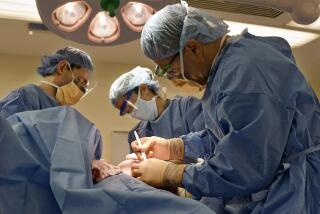Surgery may lower cancer risk
- Share via
Women genetically predisposed to two types of reproductive cancer can virtually end that risk by having their uterus and ovaries removed after they are finished having children, researchers have found.
The genetic disorder, known as Lynch syndrome, is found in one of every 1,000 people. Women who carry the defect have a 60% chance of developing endometrial cancer, a disease of the lining of the uterus. The risk for women without the disorder is 3%.
Those with Lynch syndrome also have a 12% chance of developing ovarian cancer, compared with 1% or 2% for women without the disorder.
“Although it’s a small group of individuals [with Lynch syndrome], their risk is exponentially high,” author Dr. Karen Lu said in an interview. The study was published in the Jan. 19 issue of the New England Journal of Medicine.
Lu, an associate professor of gynecologic oncology at the University of Texas M.D. Anderson Cancer Center in Houston, and her colleagues examined the records of 315 women whose genetic testing revealed Lynch syndrome to determine whether women who have the surgery still have ovarian or other reproductive cancer cells in their bodies that will then affect other organs.
Of the 61 who had a hysterectomy to remove their uterus and 47 who had their ovaries removed, none developed ovarian or endometrial cancer in tissues left behind after surgery.
But in a group of 254 women with no surgery, 69 developed endometrial cancer and 12 were diagnosed with ovarian cancer.
The finding “allows physicians to say to women, ‘This is something you can actively do to prevent getting endometrial cancer, and probably ovarian cancer as well,’ ” Lu said.
Tests for Lynch syndrome usually are not done until a family member develops cancer, usually colon cancer, at an early age. Even then, many doctors fail to realize that it raises the risk of reproductive tumors, she said.
Although cancer prevention surgery carries risks, “my experience is that most women, when they’ve completed their childbearing, have no problem undergoing a hysterectomy, especially when they’ve seen family members die of endometrial or ovarian cancer,” Lu said.
“In comparison to what could happen to them, they don’t have a problem with it,” she added.
Women who decide not to have children should consider surgery beginning at age 35, the researchers said.
In a Journal editorial, Kenneth Offit and Noah Kauff of the Memorial Sloan-Kettering Cancer Center in New York said it remained unclear whether that surgery would increase survival because the success rate for treating such cancers is high.





